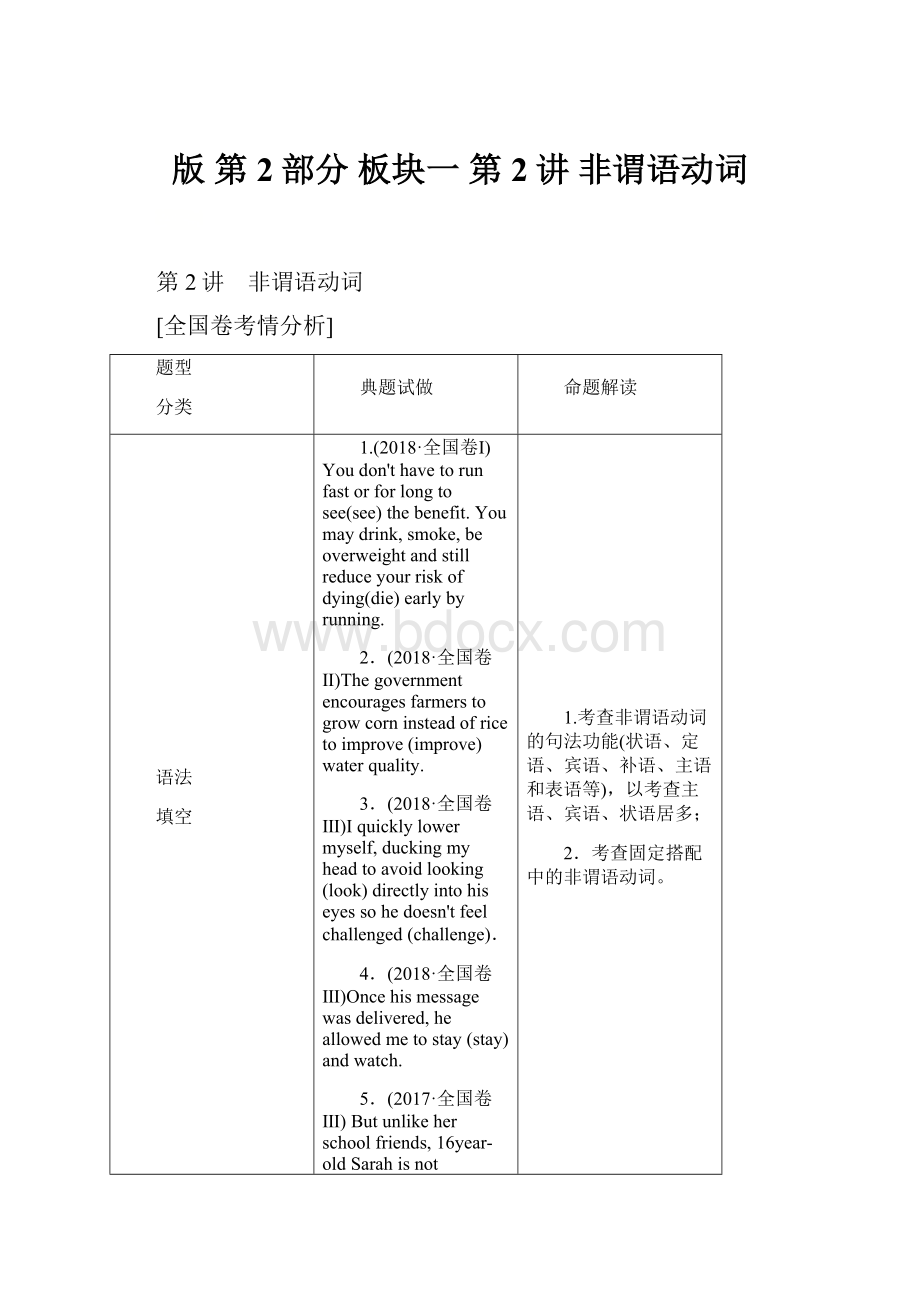版 第2部分 板块一 第2讲 非谓语动词.docx
《版 第2部分 板块一 第2讲 非谓语动词.docx》由会员分享,可在线阅读,更多相关《版 第2部分 板块一 第2讲 非谓语动词.docx(15页珍藏版)》请在冰豆网上搜索。

版第2部分板块一第2讲非谓语动词
第2讲 非谓语动词
[全国卷考情分析]
题型
分类
典题试做
命题解读
语法
填空
1.(2018·全国卷Ⅰ)Youdon'thavetorunfastorforlongtosee(see)thebenefit.Youmaydrink,smoke,beoverweightandstillreduceyourriskofdying(die)earlybyrunning.
2.(2018·全国卷Ⅱ)Thegovernmentencouragesfarmerstogrowcorninsteadofricetoimprove(improve)waterquality.
3.(2018·全国卷Ⅲ)Iquicklylowermyself,duckingmyheadtoavoidlooking(look)directlyintohiseyessohedoesn'tfeelchallenged(challenge).
4.(2018·全国卷Ⅲ)Oncehismessagewasdelivered,heallowedmetostay(stay)andwatch.
5.(2017·全国卷Ⅲ)Butunlikeherschoolfriends,16�year�oldSarahisnotspendinghalf�termresting(rest).
1.考查非谓语动词的句法功能(状语、定语、宾语、补语、主语和表语等),以考查主语、宾语、状语居多;
2.考查固定搭配中的非谓语动词。
短文
改错
1.(2018·全国卷Ⅰ)Mygrandpasaidlastsummertheyearnedquitealotbysellthefish.sell→selling
2.(2018·全国卷Ⅱ)Asakid,Ilovedtowatchcartoons,butnomatterhowmanytimesIaskedtowatchingthem,myparentswouldnotletme.watching→watch
3.(2018·全国卷Ⅲ)Everyonewassilent,waittoseewhowouldbecalledupontoreadhisorherparagraphaloud.wait→waiting
4.(2018·全国卷Ⅲ)Someofuswereconfidentandeagertakepartintheclassactivity;otherswerenervousandanxious.eager后加to
5.(2017·全国卷Ⅱ)Whensummercomes,theywillinvitetheirstudentspickthefreshvegetables!
pick前加to
1.谓语动词与非谓语动词的错用;
2.过去分词与现在分词的错用;
3.不定式符号to的多余或缺失;
4.to是介词还是不定式符号的误判。
考点一非谓语动词的形式及意义
[先试做题组]
单句语法填空
1.(2019·湖北武昌区高三调考)TheYangtzeRiver,known(know)inChinaastheChangJiangisthelongestriverinAsiaandthelongestintheworldtoflowentirelywithinonecountry.
2.(2019·玉溪月考)Youloseweightforawhile,onlytogain(gain)backmoreweightwhenyoustopyourweightlossprogram.
3.(2019·湖南六校联考)Ofcourse,enjoying(enjoy)anicemealwithfriends,whateverweeat,canalsoimpactourspirits.Beingwithfriendsandfamilyplaysabigpartinexperiencinghappiness.
[再解读要点]
非谓语动词
主动语态
被动语态
意义
不定式
一般式
todo
tobe
done
表示的动作与句中谓语动词的动作同时发生或在其后发生
进行式
tobe
doing
表示的动作与句中谓语动词的动作同时发生
完成式
tohave
done
tohave
been
done
表示的动作发生在句中谓语动词的动作之前
现在分词/
动名词
一般式
doing
being
done
表示的动作与句中谓语动词的动作同时发生,或基本上同时发生
完成式
having
done
having
beendone
表示的动作先于句中谓语动词的动作发生
过去分词
一般式
done
与句中主语为逻辑上的被动关系,表完成
Havingbeenfiredbythecompany,themannowhasdifficultiesinsupportinghisfamily.
被公司解雇了,这位男士难以养活他的家庭。
TherearestillmanyproblemstobesolvedbeforewearereadyforalongstayontheMoon.在我们准备在月球上长住之前,还有很多问题仍需要解决。
考点二非谓语动词作状语
[先试做题组]
Ⅰ.单句语法填空
1.(2019·广东七校联考)Wewenttoafastfoodrestaurantfordinnertogether.Myhusbandwenttothecountertoorder(order)dishesandIstoodwithmyparents.
2.(2019·合肥检测)EmperorQinShihuangsimplifiedChinesecharactersandsetregularrules,making(make)iteasierforpeopletolearnandmaster.
3.(2019·福州模拟)Withmyeyestightlyclosed(close),Idivedinandmademywaytotheotherend.
Ⅱ.单句改错
4.(2019·长沙一模)Theboybroughthisguitartothestage,wornafashionablehat,whichmadehimseemsomysterious.worn→wearing
5.(2019·长春模拟)Thoughtthathissolutionmightbewrong,Icarefullyanalyzedtheproblemandtriedtoworkitoutinadifferentway.Thought→Thinking
[再解读要点]
1.不定式作状语
(1)作目的状语,可用soasto/inorderto替换,但soasto一般不可置于句首,意为“为了;想要”。
(2016·北京卷)Tomakeiteasiertogetintouchwithus,you'dbetterkeepthiscardathand.
为了便于联系我们,你最好将这张卡片放在身边。
(2)作结果状语,常表示出乎意料的结果,常用于下列结构中:
onlytodo;enoughtodo(足够做……);too...todo...(太……而不能……);so/such...asto...(如此……以至于……)等。
Tomtookataxitotheairport,onlytofindhisplanehighupinthesky.汤姆乘出租车去了机场,结果发现他要乘坐的飞机已飞入高空。
(3)作原因状语,常用在“主语+系动词+形容词+todo”结构中。
这类形容词有:
easy,difficult,hard,cheap,expensive,fit,comfortable,heavy,good,important,impossible,dangerous,surprised,astonished,delighted,disappointed等。
Wewereastonishedtofindthetemplestillinitsoriginalcondition.
令我们吃惊的是,这座寺庙仍保持着最初的样子。
[易错提示] 语法填空和短文改错中常考查“主语+be+形容词+不定式”结构,句子的主语和不定式构成逻辑上的动宾关系,且此时不定式通常用主动形式表示被动意义。
另外需注意的是在该结构中,不定式中的动词必须是及物动词;若为不及物动词,则要在其后加上适当的介词,使之构成及物动词短语。
2.分词作状语
非谓语动词作状语时,其逻辑主语通常就是句子的主语。
现在分词作状语时,现在分词所表示的动作与句子主语之间构成逻辑上的主动关系。
过去分词作状语时,过去分词所表示的动作与句子主语之间构成逻辑上的被动关系。
Orderedoveraweekago,thebooksareexpectedtoarriveanytimenow.这些书是一个多星期以前订购的,现在有望随时到货。
Likeancientsailors,birdscanfindtheirwayusingthesunandthestars.像古代的船员一样,鸟类可以利用太阳和星星找到它们的路。
[名师点津] 部分过去分词作状语时不表示被动,也不表完成,而表示一种状态。
常见的有:
located(坐落于),lost(迷路的),seated(坐着的),hidden(躲着的),lost/absorbed/buriedin(沉溺于),dressedin(穿着),tiredof(厌烦的),facedwith(面对着)。
Absorbedinpainting,Johndidn'tnoticeeveningapproaching.
由于专心绘画,约翰没有注意到夜幕正在降临。
3.独立成分作状语
有些分词或不定式短语作状语,其形式的选择不受上下文的影响,称作独立成分。
常考的有:
generally/frankly/roughly/strictlyspeaking,talkingof,speakingof,judgingfrom/by,takingeverythingintoconsideration,comparedto/with,tobefrank,totell(you)thetruth,tobehonest,tomakethingsworse等。
Judgingfromhisaccent,heisfromHongKong.
从口音判断,他是香港人。
Totellyouthetruth,Iamalittletired.
说实话,我有点累。
4.独立主格结构
非谓语动词作状语时,它的逻辑主语应和句子主语保持一致。
但有时非谓语动词带有自己的逻辑主语,在句子中作状语,我们称之为独立主格结构。
(1)独立主格结构的特点:
①独立主格结构的逻辑主语与句子的主语不同,它独立存在。
②独立主格结构中作逻辑主语的名词或代词与后面的分词或不定式是逻辑上的主动或被动关系。
③独立主格结构一般用逗号与句子分开。
(2)独立主格结构的构成:
①名词/代词+分词;②名词/代词+不定式;③with/without+名词/代词+分词/不定式。
Thetestfinished(=Whenthetestwasfinished),webeganourholiday.考试结束后,我们就开始放假了。
考点三非谓语动词作定语
[先试做题组]
Ⅰ.单句语法填空
1.(2019·湖北八校第一次联考)Noonecanignoretherichculturedating(date)backtoancienttimeschangingintothemodernageataspeedandscalethathasneverbeenwitnessed.
2.(2019·洛阳统考)The15�year�oldboyfromOaklandhasfascinatedaudienceintheU.S.andChinawithhisabilitytosing(sing)pitch�perfectMandarin(普通话)andperformtheancientChineseartform.
3.(2019·长治五校一联)Withapuzzled(puzzle)lookonmyface,Ipointedtomyselfandsaid,“Me?
”
4.(2019·重庆联考)Ifeltlikeanidiot.Ishouldnothaveleftwithoutchargingmycellphone.ThebatterywasdeadandIwasalonewithoutanywaytocontact(contact)myfamily.
Ⅱ.单句改错
5.(2019·重庆月考)TheChineserestaurantnamingNewPandaBuffetprovidesgenuineChinesefood,whichmanydinershavegiven5�starreviews.naming→named
[再解读要点]
1.不定式作定语
(1)不定式作定语通常放在所修饰词之后,表示将来的动作。
不定式与其所修饰的词之间往往是动宾关系,若该不定式是不及物动词,其后应有必要的介词。
Suddenlyagoodideaoccurredtoher,butshecouldn'tfindanypapertowriteon.突然她想到了一个好主意,但是她找不到纸把它写下来。
(2)序数词,形容词最高级,thelast,theonly等后或被这些词修饰的名词/代词后,常用不定式作定语。
Heisalwaysthefirsttoarriveattheschoolandthelasttoleavetheschool.
他总是第一个到校,最后一个离校。
(3)被修饰词是抽象名词时,常用不定式作定语。
常见名词:
ability,chance,idea,hope,wish,fact,excuse,promise,attempt,way等。
Andthebestwaytostrengthenwillpoweristomakeitintoahabit.
增强意志力最好的方法就是让意志力成为一种习惯。
Theabilitytoexpressanideaisasimportantastheideaitself.表达观点的能力与观点本身同等重要。
2.分词作定语
(1)作定语的及物动词的分词形式有:
现在分词、“being+过去分词”、过去分词。
当被修饰的名词与分词之间为主动关系时,用现在分词;当被修饰的名词与分词之间为被动关系且表示正在进行时,用“being+过去分词”;当被修饰的名词与分词之间为被动关系且表完成时,用过去分词。
(2)作定语的不及物动词的分词形式为:
现在分词和过去分词。
现在分词表示动作正在进行;过去分词只表示动作已完成,不表被动。
Toreturntotheproblemofwaterpollution,I'dlikeyoutolookatastudyconductedinAustraliain2012.
为了再讨论一下水污染的问题,我想让大家看一项2012年在澳大利亚进行的研究。
Lastnight,thereweremillionsofpeoplewatchingtheopeningceremonyliveonTV.
昨天晚上,有几百万人观看了开幕式的电视直播。
[名师点津] 非谓语动词作定语的解题思路
表示被动、完成用过去分词(done);表示主动、进行用现在分词(doing);表示被动、进行用beingdone;表示主动、尚未进行用todo;表示被动的动作尚未进行用tobedone。
试比较:
①Thebridgebuiltrecentlywasdesignedbyalocalcompany.
②Todaytherearemoreairplanescarryingmorepeoplethaneverbeforeinthesky.
③Thebridgebeingbuiltnowwasdesignedbyalocalcompany.
④Thequestiontobediscussedattomorrow'smeetingisveryimportant.
考点四非谓语动词作宾语
[先试做题组]
Ⅰ.单句语法填空
1.(2019·龙岩期中)Veryoften,opportunitiescomequietlyandgobywithoutbeingnoticed(notice).
2.(2019·湖北八校联考)Onelearnsalanguagebymakingmistakesandcorrecting(correct)them.
3.(2019·长治一联)Irememberedtolock(lock)thedoorbeforeIlefttheoffice,butforgottoturnoffthelights.
Ⅱ.单句改错
4.(2019·西安六校联考)Beforeheardhisanswer,shestartedtoreadhimalmosteverysinglegreetingcardoutlouduntiltheelderlymansmiled.heard→hearing
5.(2019·广东七校联考)IliketravellingandmydreamofvisitBeijing—thecapitalcityofourcountry—cametrueduringtheNationalDayholidaysthisyear.visit→visiting
[再解读要点]
1.只接不定式作宾语的动词:
agree,intend,plan,demand,promise,prepare,decide,refuse,choose,wish,hope,expect,fail(未能),pretend,manage,determine,beg,arrange,threaten,claim,hesitate,wait,happen(碰巧)等。
Sheseatedherselfatasmalltableintherestaurant,waitingtobeserved.
她坐在餐馆里的一张小桌子旁等着被服务。
2.只接动名词作宾语的动词及短语:
admit,avoid,consider,escape(避开),imagine,mind,miss,practise,suggest,feellike,giveup,putoff,objectto,lookforwardto等。
此外,havedifficulty/trouble(in)doingsth.;havefun(in)doingsth.等句型中也用动名词作宾语。
Iavoidedmentioningthesubjectincaseheshouldbeoffended.我回避提及这个话题,以免冒犯他。
It'squitehottoday.Doyoufeellikegoingforaswim?
今天很热。
你想去游泳吗?
3.接不定式与动名词作宾语意义不同的动词:
IrememberedtolockthedoorbeforeIlefttheoffice,butforgottoturnoffthelights.
我离开办公室之前记得关门却忘记关灯了。
—Thatwouldmeanwastingalotoflabour.
——那将意味着浪费许多劳动力。
—Really?
Idon'tmeantowasteanylabour.
——是吗?
我并没打算浪费劳动力。
WassheworriedabouthowIwouldreactorthatIwouldstopbuyingthegroceriesifIfoundout?
她是担忧如果我发现这件事情我的反应还是担忧我不再给她买食品杂货呢?
[易错提示]
(1)动词want,need,require作“需要”讲时,其后要用v.�ing形式的主动形式或不定式的被动形式作宾语。
与此用法相同的动词还有deserve(值得)。
(2)不定式作动词(短语)learn,decide,know,wonder,show,tell,understand,explain,teach,advise,findout等的宾语时,前面常带引导词how,what,whether,where,when,who等。
(3)介词后一般要接v.�ing形式作宾语,但介词but/except后接不定式作宾语,若前有实义动词do,不定式要省略to。
考点五非谓语动词作宾补
[先试做题组]
Ⅰ.单句语法填空
1.(2019·济宁二模)Letthoseinneedunderstand(understand)thatwewillgoallouttohelpthem.
2.(2019·龙口一模)Whenwesawtheroadblocked(block)withsnow,wedecidedtospendtheholidayathome.
3.(2019·黄冈一模)Themanagerwassatisfiedtoseemanynewprodu